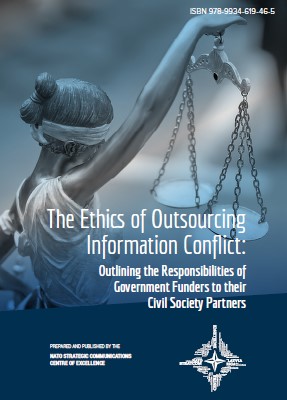The Ethics of Outsourcing Information Conflict: Outlining the Responsibilities of Government Funders to their Civil Society Partners
The Ethics of Outsourcing Information Conflict: Outlining the Responsibilities of Government Funders to their Civil Society Partners
Author(s): James Pamment, Anneli Ahonen
Subject(s): Media studies, Ethics / Practical Philosophy, Civil Society, Government/Political systems, Security and defense, Electoral systems, Political behavior, Politics and communication, ICT Information and Communications Technologies
Published by: NATO Strategic Communications Centre of Excellence
Keywords: Information conflict; NGOs; Disinformation and influence operations; contested truths;
Summary/Abstract: Non-governmental organisations (NGOs), researchers, journalists, and the private sector are often the main actors actively countering disinformation and influence operations. While governments maintain some counter-disinformation capabilities, they tend to outsource much of the day-to-day work through, for example, programmatic funding. It is more cost-effective and credible to fund independent, non-partisan NGOs to debunk disinformation than for a government to get caught up in trying to correct the sensitive issues that disinformation often entails. Indeed, in a recent Washington Post op-ed, former Radio Free Europe/Radio Liberty President Thomas Kent lauds the role of NGOs in countering disinformation and urges governments to keep finding funding for them: “Volunteer activists fight it out with trolls online, penetrate and disrupt conspiracy chat rooms, campaign for companies to stop advertising on disinformation sites, and post memes ridiculing Russian propaganda.”1 They do all the things, in other words, that governments can’t or won’t do at scale.
- Print-ISBN-13: 978-9934-619-46-5
- Page Count: 32
- Publication Year: 2023
- Language: English
- eBook-PDF
- Table of Content

